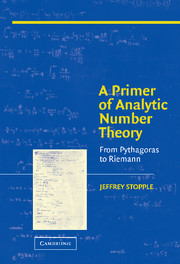Book contents
- Frontmatter
- Contents
- Preface
- Chapter 1 Sums and Differences
- Chapter 2 Products and Divisibility
- Chapter 3 Order of Magnitude
- Chapter 4 Averages
- Interlude 1 Calculus
- Chapter 5 Primes
- Interlude 2 Series
- Chapter 6 Basel Problem
- Chapter 7 Euler's Product
- Interlude 3 Complex Numbers
- Chapter 8 The Riemann Zeta Function
- Chapter 9 Symmetry
- Chapter 10 Explicit Formula
- Interlude 4 Modular Arithmetic
- Chapter 11 Pell's Equation
- Chapter 12 Elliptic Curves
- Chapter 13 Analytic Theory of Algebraic Numbers
- Solutions
- Bibliography
- Index
Chapter 3 - Order of Magnitude
Published online by Cambridge University Press: 05 September 2012
- Frontmatter
- Contents
- Preface
- Chapter 1 Sums and Differences
- Chapter 2 Products and Divisibility
- Chapter 3 Order of Magnitude
- Chapter 4 Averages
- Interlude 1 Calculus
- Chapter 5 Primes
- Interlude 2 Series
- Chapter 6 Basel Problem
- Chapter 7 Euler's Product
- Interlude 3 Complex Numbers
- Chapter 8 The Riemann Zeta Function
- Chapter 9 Symmetry
- Chapter 10 Explicit Formula
- Interlude 4 Modular Arithmetic
- Chapter 11 Pell's Equation
- Chapter 12 Elliptic Curves
- Chapter 13 Analytic Theory of Algebraic Numbers
- Solutions
- Bibliography
- Index
Summary
In his Introduction to Arithmetic, Nicomachus wrote the following:
It comes about that even as fair and excellent things are few and easily numerated, while ugly and evil ones are widespread, so also the abundant and deficient numbers are found in great multitude and irregularly placed – for the method of their discovery is irregular – but the perfect numbers are easily enumerated and arranged with suitable order; for only one is found among the units, 6, only one among the tens, 28, and a third in the rank of the hundreds, 496 alone, and a fourth within the limits of the thousands, that is, below ten thousand, 8128.
Nicomachus is clearly implying that the nth perfect number has n digits. We already know this is wrong; we discovered in Chapter 2 that the fifth perfect number is 33550336. According to Dickson, 1999, Iamblichus in his Commentary on Nicomachus states this even more explicitly, and the mistake was subsequently repeated by Boethius in the fifth century. In the twelfth century, Abraham ben Meir ibn Ezra made the same claim in his commentary to the Pentateuch. In the fourteenth century, Thomas Bradwardine, mathematician and physicist, repeated the claim in his book Arithmetica Speculativa. Bradwardine became Archbishop of Canterbury but died shortly after of the Black Death in 1349.
Despite being wrong, this claim by Nicomachus is important because it is the very first of its kind. It examines the distribution of perfect numbers among all the integers. Because of Euler's theorem (see Chapter 2), we know that even perfect numbers correspond to prime Mersenne numbers.
- Type
- Chapter
- Information
- A Primer of Analytic Number TheoryFrom Pythagoras to Riemann, pp. 43 - 63Publisher: Cambridge University PressPrint publication year: 2003



